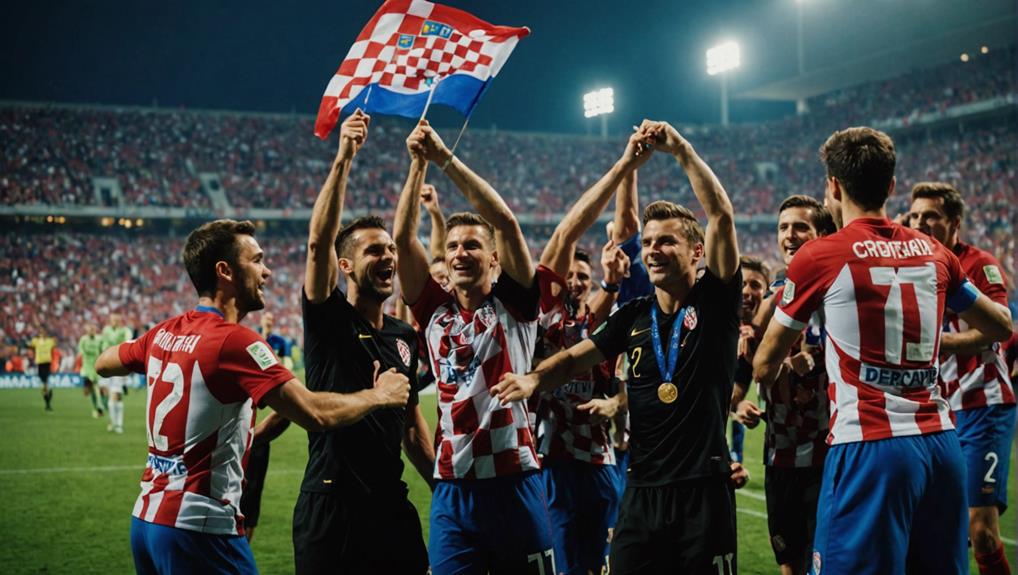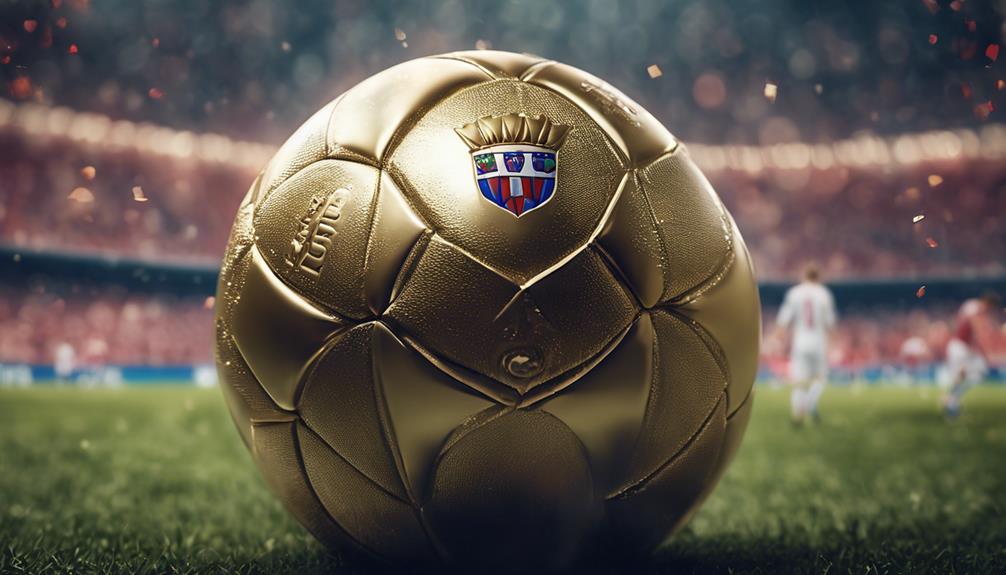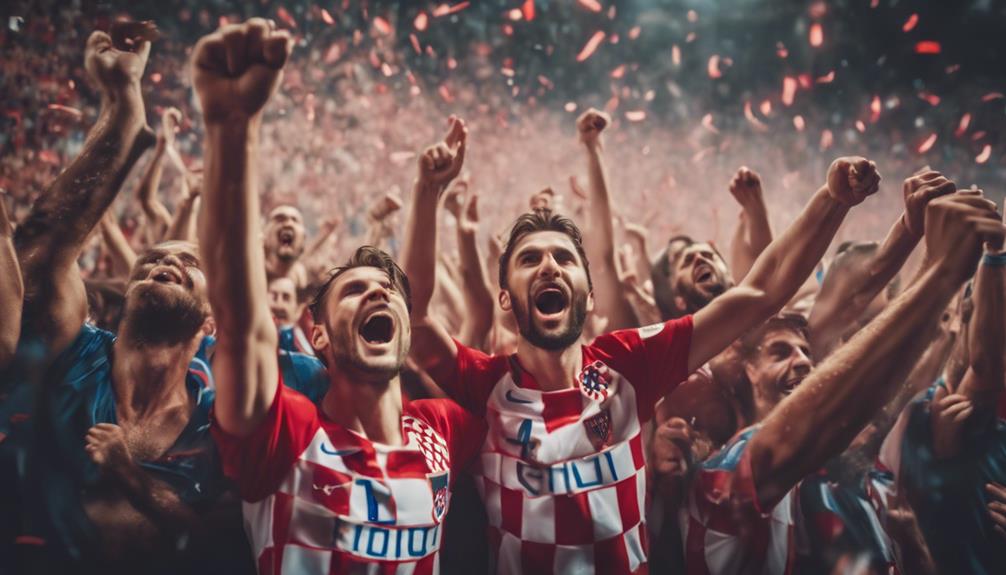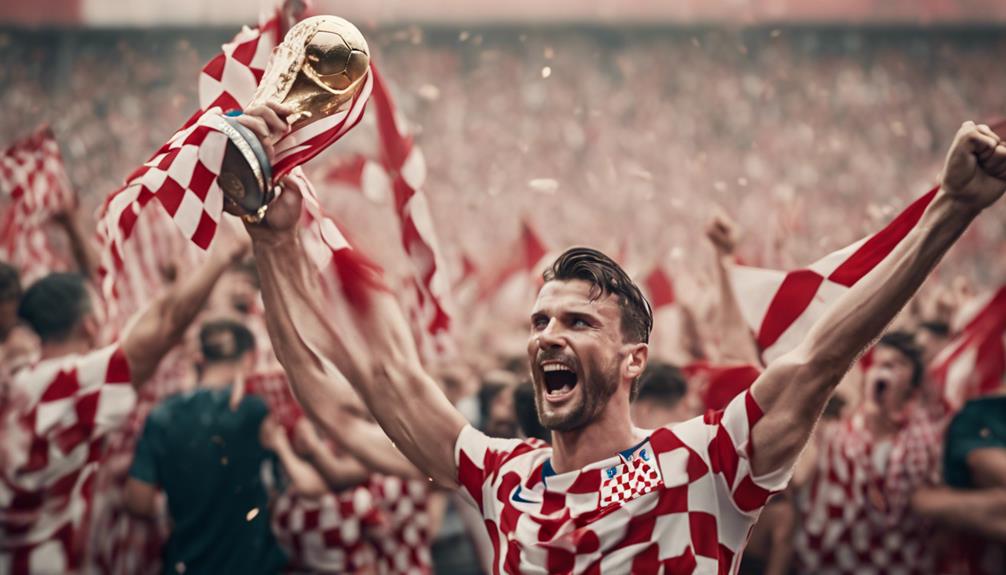
The Croatia Football Team: Journey to Success
August 2, 2024Embark on a gripping journey through the rise of the Croatia football team, marked by international triumphs and unwavering determination that led to an unforgettable 2018 World Cup runner-up finish. From their inception in 1990 to the stellar coaching tenures and memorable World Cup performances, Croatia's team has showcased resilience and skill. Supported by passionate fans and a strong charitable ethos, they've become a beacon of national pride. Led by star players like Luka Modrić, their unity and tactical acumen have been key to their success. Discover the enthralling story behind Croatia's football prowess and remarkable achievements in tournaments.
Historical Overview and Achievements
Since Croatia's football journey began in 1990, the national team has achieved remarkable success both on the international stage and within its domestic leagues. One of the most significant moments in Croatia's football history was their remarkable performance in the 2018 World Cup, where they finished as runners-up, showcasing the talent and determination of the national team. Led by stars like Luka Modrić, the team's captain, and coached by Slaven Bilić, this era marked what many consider Croatia's 'golden generation.'
This success wasn't a one-time occurrence, as Croatia has consistently performed well in major tournaments, finishing third in the World Cup in 1998 and 2022, and reaching the quarter-finals of the UEFA European Championship twice. The team's achievements have solidified its reputation as a force to be reckoned with in international football, with a rich history dating back to their first official international victory over Switzerland in 1940.
Coaching Periods and Team Performance
Notable coaching periods have played a pivotal role in shaping the performance of the Croatia national football team. Coaches like Jozić, Barić, and Kranjčar led the team from 2000 to 2006, followed by Bilić from 2006 to 2012.
Under various coaching regimes, Croatia qualified for the 2006 and 2014 World Cups, as well as topping their group in Euro 2016. However, from 2012 to 2017, coaching changes with Štimac, Kovač, and Čačić impacted team performance.
The team experienced its worst aggregate win-rate in 2020, drawing criticism after a loss to Spain in the Euros. Throughout the team's journey to success, they navigated different coaching eras with varying strategies and outcomes, showcasing the significant influence of coaching periods on the Croatia national team's overall performance.
World Cup Performances and Records

Croatia's World Cup performances highlight their resilience and determination, showcasing historic achievements on the global stage. The national team's success in major tournaments reflects Croatia's footballing pedigree and competitive spirit.
Croatia secured a bronze medal in the 1998 World Cup, a significant milestone in their football history. Additionally, in the 2018 World Cup, Croatia advanced from the group stage, further solidifying their presence as a formidable contender on the international scene.
Notable records include Croatia's prowess in penalty shoot-outs at the World Cup, emphasizing their mental strength and composure in high-pressure situations. The team's remarkable performance led to being named FIFA Best Mover of the Year in both 1994 and 1998.
In 1998, Croatia reached third place in the FIFA World Rankings, a reflection of their consistent excellence and impact in the world of football. Croatia's journey in the World Cup has been marked by remarkable achievements and a resilient spirit that continues to inspire fans worldwide.
Team Image, Support, and Charity
You'll be amazed by the unwavering support Croatia's team receives from devoted fans, including those of Dinamo Zagreb and Hajduk Split.
The team's charitable efforts, spearheaded by the Vatreno Srce Foundation, demonstrate their commitment to helping children in need.
Through auctions and donations, players actively contribute to causes like COVID-19 relief, showcasing their dedication to making a positive impact beyond the football field.
Fan Base Support
With a distinctive red and white checkered jersey introduced in 1990, the Croatia Football Team has garnered strong support from passionate fans, particularly those affiliated with Dinamo Zagreb and Hajduk Split.
The team's fan base is known for its unwavering dedication and fervor, embodying national pride in every match they attend. This support extends beyond the stadiums, with initiatives like the Vatreno Srce Foundation, founded by Slaven Bilić in 2010, emphasizing charitable endeavors to assist children in need.
Through charity events, auctions, and player contributions, the Croatian football community actively participates in giving back to society, supporting causes such as COVID-19 relief.
The team's fan base not only cheers for victories on the field but also exemplifies a deep-rooted sense of community spirit, showcasing how football can unite people for a greater cause. Their commitment to both the team and charitable initiatives reflects a profound bond between football, fans, and social responsibility in Croatia.
Charitable Initiatives
Embodying a strong sense of community spirit, the Croatia Football Team actively engages in charitable initiatives to make a positive impact on society. The Vatreno Srce Foundation, established in 2010 by Slaven Bilić, plays a pivotal role in supporting children through various programs.
Croatia's national team jersey, crafted in 1990 by Miroslav Šutej, symbolizes unity and national pride, reflecting the team's commitment to community values. The unwavering support from fans, especially those of Dinamo Zagreb and Hajduk Split, further strengthens the bond within the community.
The team's dedication to charitable causes is evident through charity events, auctions, and player contributions, notably during crises like the COVID-19 pandemic. These initiatives showcase the team's unwavering commitment to giving back to society and making a difference beyond the football pitch.
Players, Stadiums, and Statistics

You're about to uncover intriguing insights into the player performance analysis and venue utilization overview of the Croatia national football team.
From examining key statistics to exploring the strategic decisions behind stadium choices, get ready to explore the intricacies of how players and locations contribute to the team's success.
Stay tuned for an enlightening exploration of the essential elements that shape Croatia's football journey.
Player Performance Analysis
The Croatia national team's player performance analysis involves examining player performance, statistics, squad depth, match results, upcoming fixtures, and historical data to gauge the team's success and areas for improvement.
The squad's depth for UEFA Euro 2024, consisting of 26 players, reflects the talent available to the national team.
Detailed player statistics, including call-ups, injuries, and retirements, are meticulously tracked by the Croatian Football Federation, providing valuable insights into individual and team performances.
Additionally, information on recent match results and upcoming fixtures offers a glimpse into the team's current form and future challenges.
Historical data on managers' performances in major competitions further enriches the analysis, providing a comprehensive overview of coaching periods and team dynamics.
The team's home matches at Stadion Maksimir in Zagreb, a prominent football stadium in Croatia, serve as the backdrop for their journey to success.
Venue Utilization Overview
With the Croatia national team playing their home matches in various stadiums across the country, including the primary venue of Stadion Maksimir in Zagreb, a thorough overview of venue utilization can be observed. Stadion Maksimir, with a seating capacity exceeding 35,000 spectators, stands as the team's fortress during pivotal matches.
The Croatia national team strategically rotates between different stadiums to maximize fan engagement and accommodate varying match dynamics. This approach allows for a diverse range of atmospheres and playing conditions, contributing to the team's adaptability and success on the field.
The players, comprising a squad of 26 for UEFA Euro 2024, showcase their skills and teamwork across these venues, drawing support from fans nationwide. The Croatian Football Federation meticulously manages player statistics, call-ups, and injuries, ensuring ideal performance and cohesion within the national team.
As fans and analysts avidly follow match results, upcoming fixtures, and historical data on managers' performances, the utilization of stadiums across the country remains a pivotal element in the Croatia national team's journey to success.
Key Factors in Croatia's Football Success
Considering Croatia's remarkable achievements in football, let's explore the main factors that have propelled the team to success.
The Croatian national football team, led by star players like Luka Modric and Ivan Perisic, has seen significant success in recent years. Their impressive performance in the first World Cup final they reached showcased the talent and determination within the Croatian team. Croatia beat strong opponents on their way to the final, demonstrating their resilience and skill on the field.
The unity and support among the players, shaped by their experiences during the Balkan war, have been pivotal in their success. Additionally, the tactical acumen of coaches, particularly under Alatko Dalic's guidance, has played a crucial role in Croatia's football achievements.
The team's ability to adapt, overcome challenges, and show unwavering determination in critical moments has been essential in their journey to success on the international stage.
Historic World Cup Run of Croatia

Croatia's historic World Cup run in 2018 captivated football fans worldwide. The Croatian team's journey to the World Cup final was nothing short of remarkable. Despite hailing from a small country, they made a historic achievement by reaching the pinnacle of world football.
Here are some key points that defined Croatia's memorable 2018 World Cup campaign:
- The Croatian team defeated England in the semifinals, securing their spot in the prestigious World Cup final.
- Against all odds, Croatia overcame demographic and economic challenges to showcase their football prowess on the world stage.
- The 2018 World Cup final presented Croatia with the opportunity to become the smallest country to win the tournament since Uruguay in 1950.
- The Croatian squad's remarkable journey to the final united the nation in pride and celebration, transcending boundaries and bringing joy to the people.
National Pride and Celebration
Amidst the jubilant atmosphere that swept across Croatia, national pride and celebration soared to unprecedented heights following the football team's remarkable success.
Massive celebrations erupted in Zagreb and throughout the country, uniting Croatians in pride and joy over the team's achievements. The Croatian government displayed solidarity by sporting national football shirts, underscoring the team's importance in the nation's identity.
The success of the national team brought immense pride to Croatia, demonstrating the country's deep-rooted passion for football on an international platform. Regardless of background, Croatians came together to celebrate the team's accomplishments, fostering a sense of collective achievement and enthusiasm.
The team's triumph in football not only served as a source of national pride but also as a catalyst for unity and celebration across Croatia. The euphoria of the nation reflected the profound impact of the team's success, igniting a wave of patriotism and jubilation throughout Croatia.
Conclusion
As you watch the Croatia football team celebrate their success, remember the journey they took to get there. From historic World Cup runs to inspiring performances, they've shown the world their determination and skill.
So next time you see them on the field, cheering with national pride, remember the hard work and dedication it took to reach this level of success. And maybe, just maybe, you'll feel a twinge of irony knowing that they were once considered underdogs.


